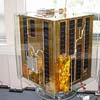 |
Bangalore - Feb 18, 2002 Indian Space Research Organisation (ISRO) and Anna University, formally announced on February 15, 2002 at Chennai, the proposed development of a micro-satellite by Anna University. The announcement marks a significant milestone in ISRO's pursuit to strengthen its University linkages that could help generate human resources for the space programme and build capacity in the Universities to undertake advanced research and development activities. According to the announcement, Anna University will build the micro-satellite and ISRO will launch the satellite as a piggyback payload on its Polar Satellite Launch Vehicle, PSLV. The satellite will be developed in about three years. Being the first of its kind for an Indian university in spacecraft development, the micro-satellite will be a comparatively simple one weighing around 60 kg. It will have body-mounted solar panels generating about 40 Watt of electrical power and will be spin-stabilised. It will have a data store-and-forward payload for conducting experiments on message transfer across the country. The micro-satellite development will be a good opportunity for the students and the faculty of Anna University to get an insight into the various aspects of space technology. It will also help them to conduct meaningful application studies and gain experience in satellite mission operations. Anna University will establish necessary facilities for the satellite development including a clean room for assembly and testing besides providing other support facilities to sustain the activity. ISRO will provide technical and managerial guidance, besides necessary financial support. It may be noted that, globally, there has been an interest in the development of micro-satellites by several universities. It is one of the most cost-effective ways for human resources development in space technology. These micro-satellites could be used to test advanced technologies for future operational satellites or for larger scientific missions. The advantage of micro-satellites is that they can be launched as piggyback payloads along with a primary satellite like IRS thus making the Micro-satellite launch affordable. The universities can provide a multi-disciplinary environment to combine the educational and research capabilities into a focused programme. It is in this context that the proposal for development of micro-satellite by Anna University assumes significance. This is expected to provide impetus for other universities to take up similar projects in the coming years. ISRO will pursue other leading educational institutions in the country to take up such ventures in order to enrich and build necessary capabilities within the university system and stimulate interests among the younger generation to take up challenging careers in science and technology. Community Email This Article Comment On This Article Related Links Indian Space Research Organisation SpaceDaily Search SpaceDaily Subscribe To SpaceDaily Express Microsat News and Nanosat News at SpaceMart.com
 Clyde, Scotland (SPX) Jan 12, 2006
Clyde, Scotland (SPX) Jan 12, 2006Clyde Space are offering the growing ranks of small satellite manufacturers power subsystem solutions for their missions. Based in purpose built facilities on West of Scotland Science Park in Glasgow, Clyde Space has a range of power subsystems for missions from as little as 1W up to in excess of 2.5kW. |
|
| The content herein, unless otherwise known to be public domain, are Copyright 1995-2006 - SpaceDaily.AFP and UPI Wire Stories are copyright Agence France-Presse and United Press International. ESA PortalReports are copyright European Space Agency. All NASA sourced material is public domain. Additionalcopyrights may apply in whole or part to other bona fide parties. Advertising does not imply endorsement,agreement or approval of any opinions, statements or information provided by SpaceDaily on any Web page published or hosted by SpaceDaily. Privacy Statement |